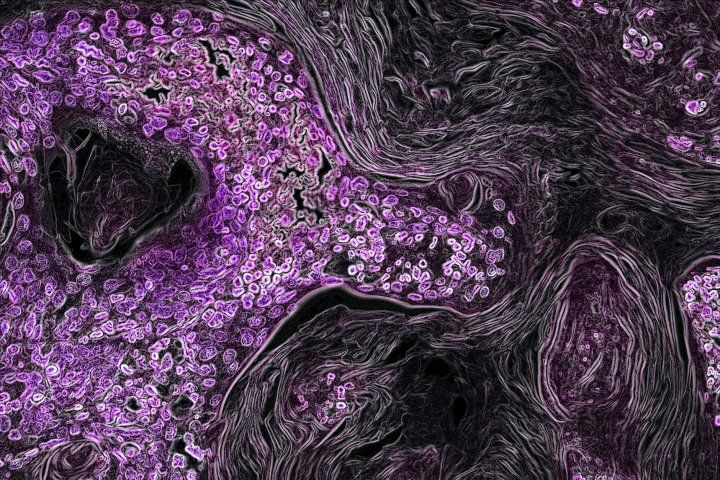 |
| A microscopic image of KRAS-driven lung cancer (purple) in a mouse model. Image credit – National Cancer Institute |
CANCER DIGEST – March 11, 2022 – By tweaking an already FDA-approved cancer drug, researchers at the University of California San Francisco have opened up new therapies for cancers with a specific mutation that are particularly difficult to treat. The study appears in the March 9, 2022 Journal of Experimental Medicine.
These cancers have a mutation in a gene called RAS and its cousin KRAS that essentially shut down the gene’s ability to regulate growth, the result is uncontrolled cell division and tumor growth.
“RAS mutations, by themselves, cause more misery than all other cancers combined, and take so many lives worldwide,” said Eric Collisson, MD, a senior author of the study and member of the UCSF Helen Diller Family Comprehensive Cancer Center. “This study brings us much closer to addressing the unmet need for better treatment of these cancers.”
The one weakness of such cancers is that they tend to concentrate iron in the cells.
Taking advantage of this feature of RAS and KRAS mutated tumors, the researchers led by Honglin Jiang, MD, and pharmaceutical chemist Adam Renslo, and Collisson all of UCSF, modified an existing drug called cobimetinib to specifically target iron-rich tissues.
“Cobimetinib is a classic example of an anticancer drug that we know works well on its target, but it hasn’t achieved its clinical potential because the same target is important in the skin and other normal tissues,” said Renslo.
Essentially the research team added a molecule to cobimetinib that makes the drug preferentially bind to high-iron containing tissues while by-passing other tissues. The result allows delivering a much higher dose to the cancerous tumor while drastically reducing side effects.
In the study the researchers tried the drug, they are calling TRX-cobimetinib, in multiple cancer cell lines and in mice and showed significantly higher levels of the drug taken up by the tumor compared to non-cancerous tissues such as skin.
With much lower side effects, the researchers were then able to combine TRX-cobimetinib with other anti-cancer drugs to provide combination treatments that proved even better at shrinking tumors while limiting side effects. The approach could open up dozens of other therapy combinations for treatment of multiple types of RAS-mutated cancers.
Collison, said the study results gives him hope that better treatment options for patients with RAS-mutated cancers will be available in the not-too-distant future.
“To be able to deliver a therapy that’s five times more potent than what we currently have and not run the patient ragged, that’s pretty exciting,” he said.
Sources: University of California San Francisco press release and the Journal of Experimental Medicine


No comments:
Post a Comment